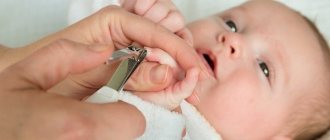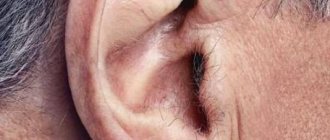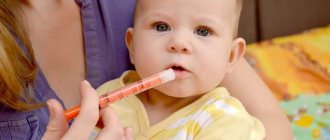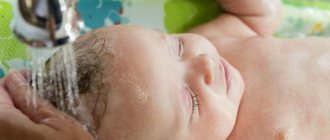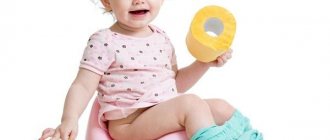April 16, 2019
Averyanova Sveta
Using diapers makes life much easier for parents: washing and ironing clothes takes less time, walks, and going to the clinic have become more comfortable. But young mothers often hear the opinion that diapers have many more disadvantages than advantages. Where the truth is is not easy to figure out. Expert help required. What are diapers made of, why boys cannot wear them after 3 years, how to use waterproof diapers without harm to health, we will tell you in our article.
Up to what age can you wear it?
When to start putting diapers on newborns is clear to everyone, but from when to wean them and put them on the potty is unclear. Some people have been practicing walking without diapers since they were one year old, others take it up to 3 years. Let's try to figure it out.
There are no age restrictions on the use of diapers.
Pediatricians recommend that mothers take the first steps towards the potty after 18 months, while simultaneously reducing the number of blotter pads they wear during the day. Remove overnight diapers when your baby wakes up dry. There is no need to do this abruptly; use a gentle method of developing toilet skills. You should definitely stop using them when your child goes to kindergarten and is over 3 years old.
Important! We strongly recommend not to compete with relatives or friends in the speed of giving up diapers. Don’t listen to your neighbors’ stories that their daughter has been peeing in the potty on her own since she was 6 months old. There is no standard on this matter.
The benefits of diapers
Using diapers for children from 0 to 2-3 years old brings a huge number of benefits to parents and the child.
No family today can do without these miracle panties for the following reasons:
- Diapers make life easier for parents. This is the main plus. There is no need to waste time washing clothes or panties. The used diaper goes into the trash bin, and mom can relax in her free time.
- Children in diapers sleep calmer and longer.
There is no need to change panties at night, the child sleeps without feeling discomfort from wet panties. Mom can also get enough sleep, so there is no need to prove the benefits of using night blotters. - The skin remains healthier under diapers. Wet diapers and onesies irritate the delicate dermis, causing rashes, diaper rash, and diaper dermatitis. Disposable and reusable diapers minimize skin contact with urine and liquid feces; diaper rash occurs much less frequently.
- Comfort while walking. While in summer it is easy to replace wet pants, in winter it is much more convenient to walk in waterproof panties: the child is protected from freezing, and the walk can last several hours.
On a note! According to statistics, each child from 0 to 2 years old uses about 4,000 disposable diapers. A family with newborns spends 50–80 thousand rubles a year on waterproof underwear.
Harm
The benefits of diapers are obvious; they are described in detail by manufacturers, advertisers, and parents of infants. But it is customary to remain silent about the harmfulness. It’s good if they don’t affect your family and you don’t find any disadvantages at all, but you need to know the dangerous aspects of using diapers:
Allergic reactions
90% of infants react positively to diapers, but 10% experience unwanted skin reactions.
This is a rash, itching, irritation under the diaper.
The manifestation of an allergy to diapers depends on the sensitivity of newborns to the composition of the diapers. Most often, children react negatively to synthetic materials, flavors, and impregnations.
This deficiency can be eliminated in several ways: change “dangerous” diapers to another brand, stop using them completely, or sew gauze or fabric panties with inserts yourself.
Greenhouse effect
The butt inside the blotting cloths overheats, especially if the room is hot. As a result, the skin becomes dry and a rash appears. To avoid this, wear diapers only outside and take air baths more often.
It takes a long time for a child to be potty trained
In diapers, babies cannot control urination. If you wear them all the time, delaying potty training, it will be difficult to avoid enuresis. If babies rarely wear diapers, mothers completely abandon waterproof diapers by the age of 1.5 years, after 7–8 months they regularly put the baby on the potty, and there are no difficulties with toilet self-control.
Mental disorders
Children who are constantly in diapers from birth to 2-3 years do not feel their body, the urge to go to the toilet, discomfort when peeing and pooping in their pants, have little contact with their mother, and their sensory integration is impaired. As a result, the psyche suffers and development is inhibited.
Inflammatory processes on the genitals in girls
They occur if changing panties is delayed, mothers do not wash out feces well from girls’ butts and vaginas.
Gait disturbance, shift in timing of independent walking
Children constantly wearing thick, reusable diapers are more likely to experience changes in their gait, trips, and falls.
Those. a child in diapers, of course, will walk well in the future, but the process of mastering the skill is delayed by 1–2 months.
On a note! It is better to identify the positive and negative aspects of using different diapers using someone else's example. Before purchasing waterproof fabrics for the first time, explore the forums and read reviews about the brands.
Myths about diapers
- Diapers do not allow air to pass through, they are harmful to the baby's skin, causing irritation and diaper rash.
- Causes curvature of the child's legs.
- In boys' diapers, the testicles overheat, which subsequently leads to infertility; in girls, cystitis develops due to the proliferation of microbes in a warm, humid environment.
- They complicate the process of potty training a child.
- Diapers contain a lot of chemicals that are hazardous to health.
In fact, once you start to look into these dire consequences of using diapers more closely, you discover that it is all just a hoax. Most often, grandmothers scare young mothers with such horrors about diapers. Mothers should still remember that in the age of information technology, it costs nothing to open any article and read reliable information, and grandmothers can be tactfully asked not to interfere in the child care process.
“The man who invented diapers accomplished a feat!” - Komarovsky E.A.
Doctor Komarovsky's opinion
Pediatrician Komarovsky actively promotes the use of disposable diapers for newborns. The doctor believes that diapers cannot be harmful or dangerous for children if used correctly. That is, change diapers on time, often “ventilate” the baby’s bottom, and observe the temperature regime in the apartment.
Komarovsky considers the harm of diapers for boys and girls to be unproven and far-fetched by opponents of disposable panties. The source of concern is often grandmothers who raised their children without waterproof helpers and consider washing 20–30 diapers and onesies a mandatory ritual of caring for newborns. The pediatrician advises them to pay attention to the mood of the children, who sleep for 3-4 hours without waking up, and the blooming appearance of a rested mother.
What Komarovsky says about diapers and what recommendations he gives to parents of infants, look here:
The whole truth about diapers
- To ensure that diapers do not cause diaper rash and irritation, they just need to be changed on time. As practice shows, damp diapers cause much more harm to the baby’s delicate skin. Mom cannot always notice a wet diaper in time, especially at night. And the diaper has a layer of gel that, under pressure, instantly absorbs moisture, leaving the skin dry. Ideally, the diaper should be changed at least a couple of times a night, without allowing it to fill to a critical level. If desired, you can use a diaper cream that protects the skin from irritation.
- Diapers do not cause crooked legs, this has been proven by scientific research. But they cause changes in gait. But this only manifests itself if a child wears reusable diapers after one year. A reusable diaper is thicker than a disposable diaper. As a result, the distance between the child’s legs is greater than normal, and the gait changes.
- Scientists have repeatedly proven that diapers do not pose a threat to the reproductive function of boys. The temperature increase in the diaper does not exceed half to one degree, which is not critical. The girl will not develop cystitis if, again, the diaper is changed on time.
- It has always been difficult for parents to potty train a child. Psychologists put it briefly on this topic - there are no children who go to school in diapers. That is, the child will definitely come to this himself. Of course, parents' help is welcome, but it is help, and not categorical putting them on the potty, accompanied by lectures and reproaches. This can lead to the opposite result - the child will be afraid of the potty, and the process will drag on for a long time.
- Diapers are required to be tested for genotoxicity and mutagenicity. There is no need to be afraid of any dire consequences from their use. Professor E.I. Keshishyan, Doctor of Medical Sciences, a famous pediatrician, speaks about this.
As can be seen from the article, if diapers are used correctly, they will not harm the child. And Dr. Komarovsky is sure that in addition to safety, they are also remarkable because they make it very easy for the mother to care for the child. After all, a happy child means a happy mother!
We recommend reading the article on how to potty train a child
Myths and truth
Discussions about the dangers and benefits of diapers have been going on between parents and doctors around the world for about 30 years. Neither side can come to a compromise or agree with the enemy’s point of view. Arguments against diapers for children are heard loudly, but there is no scientific or research evidence for the words.
As a result, several myths about diapers have become popular among people, which need to be debunked so as not to mislead young parents.
Let's figure out where the truth and lies are.
Baby overheats in diapers
It's true: a baby can actually overheat in diapers if the room is hot. Observe the temperature regime of the apartment, do not wear a diaper during illness or fever.
This is a lie: proper use of diapers cannot increase the baby's body temperature. Inside waterproof panties, the temperature rises by 0.5–1°C. This fact cannot lead to serious heat transfer disturbances.
Diapers cause dermatitis and allergies
It's true: newborn babies have very delicate skin. The dermis reacts negatively to prolonged contact with urine, feces, and the use of low-quality lotions and creams. Dermatitis in children who sleep in diapers all night can actually occur if the diaper does not suit the baby in composition, it contains pesticides, allergenic fragrances, the baby craps himself and has not been washed for several hours.
This is a lie: dermatitis does not occur due to the use of diapers, but due to individual intolerance to the caring lotions included in their composition, or the rare change of panties.
Diapers make your legs crooked
It's true: It has been proven that babies who are constantly in thick, reusable diapers with inserts walk unsteadily for 1-2 months longer. But the shape of the legs does not change, and the situation quickly normalizes.
This is a lie: the shape of the legs is formed in the womb.
It is also impossible to straighten crooked legs with tight swaddling. The harmful effects of diapers on the beauty of the limbs and their bending have not been scientifically proven.
Diapers cause developmental delays
It's true: diapers cover about 30% of a child's body. It is difficult for a child to touch the genitals and butt in them. It is also important to feel the urge to urinate, the result of pooping and peeing, and inhale the unpleasant smell of feces. Children constantly wrapped in waterproof cloths are deprived of this opportunity; the development of intelligence, emotions, and tactile sensations is slowed down.
This is a lie: even babies who are constantly in diapers are naked, that is, they can touch themselves in all places, describe the crib, their mother. Remove diapers more often, taking air baths, and developmental delays will not affect your baby.
Diapers are harmful to nature
This is definitely true when it comes to synthetic diapers made from polymer materials. They take too long to decompose, filling the planet every year. Minimize the environmental impact of waterproof diapers by purchasing biodegradable diapers made from natural materials.
I have an opinion! To develop a harmonious personality, it is important to periodically experience discomfort. This is how a person learns to distinguish bad from good and find ways to achieve good. Diapers deprive the child of this need, he already feels good. Contact with reality through the discomfort of wet pants is pushed back several years. The child grows up spoiled. This leads to behavior problems after 2–3 years.
Harm to boys
The effect of disposable diapers on the health of little men raises the greatest number of disputes and questions among parents. There is an opinion that it is impossible to constantly keep a boy in a diaper due to the risk of infertility during childbearing age. Allegedly, the greenhouse effect inside the waterproof clothes increases the temperature in the testicles and scrotum, and this affects the quality of sperm and potency. It is not true. Here's the evidence:
- Leydig hormones are responsible for sperm quality. They are found in the testicles, but become more active during puberty.
- Until 10–12 years, Leydig cells sleep and do not react to the temperature of the environment.
- Sperm is not produced in boys until puberty, that is, until they are 10–12 years old, and by this time diapers have not been used for a long time.
- To kill and weaken sperm, a very high temperature is needed, about 45°C. Inside the diaper, according to the results of laboratory tests, the air warms up no higher than 37°C.
- Potency is a man's ability to have sexual intercourse. This process has nothing to do with sperm quality. The following factors can affect male function: the amount of testosterone in the blood, nutrition, lifestyle, bad habits, chronic diseases.
Thus, the danger of using blotter cloths for male children has no scientifically proven basis. But then, can boys wear diapers all the time? It is possible, but it is necessary to follow the rules of use: wash the baby, monitor the condition of the skin, arrange for “airing” of the butt, and fully potty train it by the age of 3.
On a note! Mothers mistakenly believe that diapers cause hydrocele in boys under one year of age.
Surgeons clearly state that this opinion is wrong. The use of diapers for this disease is not prohibited, since dropsy in infants is physiological, that is, congenital in nature.
Myths and realities about the dangers of diapers for boys
- Myth 1. Diapering leads to male infertility
Surprisingly, many pediatricians still intimidate young mothers with the idea that their boy will become an infertile man or even impotent if he is put in diapers as a child.
The myth is based on the fact that when wearing diapers, the child’s temperature in the genital area increases, and this leads to a reduction in the amount of sperm. In fact, the male reproductive system begins to become active only from 7-8 years of age. Little boys do not produce sperm at all, which means there is nothing to worry about.
- Myth 2. A diaper creates a greenhouse effect
Since the diaper is closed on all sides to prevent leakage, moisture forms inside it. This has a negative effect on the skin and, of course, leads to infertility.
In real life, it is simply impossible to tightly stick a diaper to a child, which means that it is not airtight and air will get inside. Moreover, manufacturers of disposable diapers made sure that there were special holes on the surface of the diapers that allowed air to pass through. There is no greenhouse effect in diapers.
- Myth 3. Diapers cause allergies
Adults, looking at a baby in diapers, sigh sympathetically. Oh, poor baby, how can you carry such a heavy weight, and your whole skin is sweaty and covered in spots. These people clearly never wore diapers.
Modern disposable diapers not only allow air to pass through well, but are also covered with hypoallergenic material inside. The baby's skin in diapers always remains dry, thanks to a special absorbent substance. The baby has no diaper rash or allergies.
- Myth 4. Diapers cause crooked legs.
Looking at a baby in diapers, you might think that it is difficult for him to move, and he rearranges his legs in a strange way. This has led to the creation of the myth that diapers cause crooked legs.
In fact, diaper manufacturers take into account the anatomical structure of the legs and diapers do not affect their formation in any way. Curvature of the legs is transmitted genetically. Among the older generation, who did not know diapers, there are also people with bow legs, and diapers have nothing to do with it.
- Myth 5: Wearing diapers makes potty training harder for your baby.
Absolutely false statement. Many babies in diapers begin to groan when they want to go to the toilet. The main thing here is that parents be attentive, notice their baby’s urges in time and put him on the potty.
- Also, are they disposable or reusable?
Many parents use reusable diapers to save money. Pediatricians recommend disposable ones. This way, a young mother will save her baby from diaper rash and dermatitis, and herself from continuous washing.
Read also: hygiene of newborn boys
When choosing diapers, consider the following points:
- When the baby's weight is intermediate between two categories of commercially available diapers, it is better to choose a slightly larger diaper.
- Make sure that the diapers are hygroscopic (that is, the diapers must be “breathable” to avoid overheating and diaper rash), they must allow air to pass through well. If the child is over a year old, it is necessary to wear panties more often. This will help him potty train faster and you won't have to think about expensive diapers anymore.
- Try not to take diapers with fragrances. In allergic children, they can cause redness of the skin or a rash.
- Buy diapers in specialized stores or pharmacies.
- When purchasing, pay attention to the integrity of the packaging and expiration date.
So that the diaper does not harm
- Change it every 3-4 hours, especially after the baby wakes up or takes a walk.
- The baby's skin should be dry. After removing the used diaper, wash the baby, apply the cream to the skin and only then put on the diaper.
- If parents are too sensitive to the question of whether a diaper is harmful to the baby’s skin, then it can be changed immediately after urination.
- After changing the diaper, give the baby the opportunity to walk in panties or let him lie naked if it is warm. At this time, you can do massage or gymnastics.
- If the skin begins to turn red, then change the manufacturer of the diaper.
- Never use a diaper that is too small or too large. The small one will compress the body, and the large one will pass urine through non-adjacent parts.
- Do not give diapers to your child as a toy. If it breaks through, the baby can “taste” its contents (adsorbent).
- You should not use one diaper several times.
Details: Which diapers to choose for newborn babies (+ video reviews)
In this article, we debunked 5 myths about the dangers of diapers, the main one of which was the myth about male infertility. Now mothers of boys can sleep peacefully and be confident that diapers are not harmful to boys. Rather, on the contrary, a baby’s sound sleep and the absence of wet diapers will bring a lot of joy to mothers and their children.
The only problem for young families is the high price, but this is offset by amenities and comfort. Therefore, do not be afraid to use diapers, it will not harm the baby in any way

